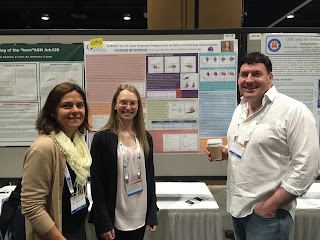The Winter meeting of this year's American Astronomical Society (AAS), the 227th overall, held last week in Kissimmee, Fl, witnessed the most significant JMU presence yet, featuring five members of our Physics and Astronomy Department: two of our undergraduate students, Catherine Witherspoon and Jason Ferguson, along with Anca Constantin, Keigo Fukumura, and Sean Scully (faculty).
The winter AAS meetings are the largest gathering of american astronomers anywhere, and the AAS refers to it as the "superbowl of astronomy." Besides multiple and parallel science sessions, as well as workshops and splinter meetings, at these meetings official AAS business happens, prizes are awarded, job interviews are held, textbooks and telescope equipment are presented and purchased, collaborations are forged, and some of the biggest announcements in astronomy are made.
Basically, the pulse of the Universe is taken, one talk or poster at a time.
Work presented by JMU affiliates and their collaborators include new results on:

1. Searching for signatures of black hole accretion in centers of
bulgeless galaxies using new data from the Large Binocular Telescope
2. Understanding the potential links between the water megamaser
activity and nuclear galactic obscuration using data from the
Wide-Field Infrared Survey Explorer

3. The nature of the ultraviolet and X-ray absorbers present around
supermassive black holes, via novel modeling of the global magnetic
fields originating from the black hole accretion disk
4. The mid and far infrared luminosity density and the Gamma-ray
opacity of the universe
Catherine and Jason's work has been supported by the 4-VA Collaborative at James Madison University, University of Virginia/NRAO, and George Mason University.
Catherine's thoughts on her first AAS meeting: one of the best parts of the meeting was the Annie Jump Cannon Award talk about the dynamics of planets, stars, and black holes in triple systems. The speaker made most of her work understandable even to the lowly undergraduate, which was nice because there were some talks where I barely understood more than a few sentences at a time. However, the presentations opened up my eyes to entirely new areas of astronomy that I didn’t know existed and the other astronomers were always willing to chat with me about their research as well as my own research. This AAS meeting was an amazing experience that I hope to have again in the future.
And here are Jason's: an inspirational experience. I had the chance to meet many important astrophysicists from all over the USA including from the NRAO and NASA. I learned about what has been discovered this past year by the astronomical community as well as what is in store for the future. I presented my own research at a poster session during the conference, and I was able to do invaluable networking with other conference goers. There was an undergraduate session where I acquired information about various graduate school programs and internship opportunities. I am so excited for my next AAS!